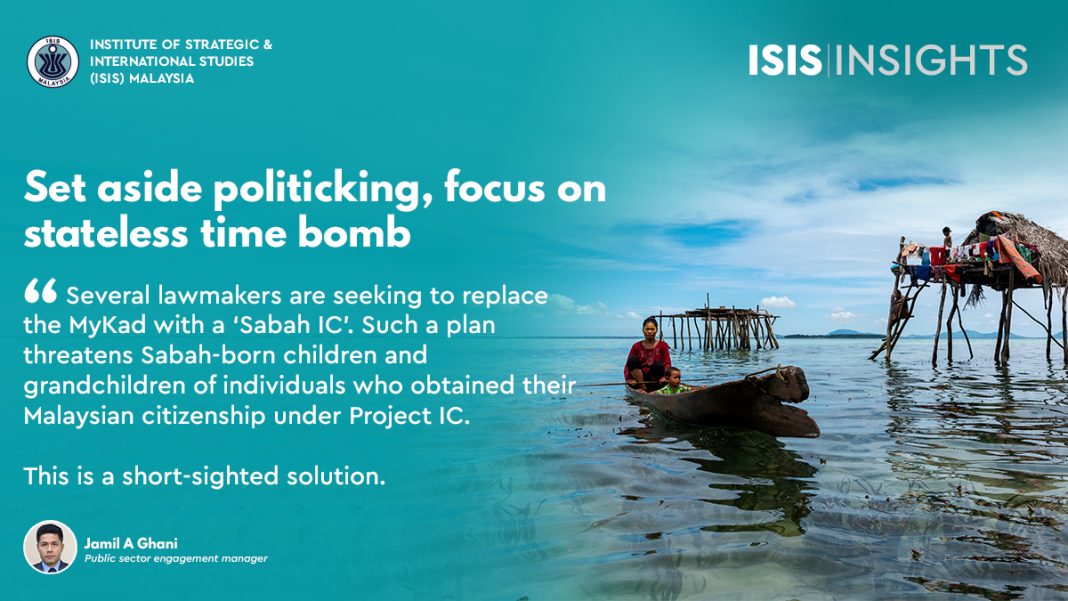Situation in Sabah will worsen if documentation eludes another generation
AT the 89th Malaysian Armed Forces Day celebrations on 16 September, chief Gen Tan Sri Affendi Buang, in a special interview, emphasised the need to boost the number of border posts and regiments stationed in Sabah and Sarawak.
This is due to the relocation of Indonesia’s capital to Nusantara, which is expected to commence in the first quarter of 2024. He was alluding to the fact that the new capital could lead to an increase in population, thereby contributing to the rise in cross-border crime.
The primary function of the MAF is traditional security, namely to protect the state from military aggression by another country or organisation. Conversely, cross-border crime or transnational crime is a non-traditional security (NTS) issue. Within this context, due to its uncontrolled nature, illegal migration is considered the most harmful component of migratory flows.
To tackle NTS-related issues, we need people-based, multilateral, multisectoral and holistic solutions. This requires shifting attention from state-based security to people-based security, recognising that by not resolving issues, such as statelessness, would bring about multifaceted repercussions.
Of all the states, Sabah has the most urgent need for such people-based solutions to deal with the growing problem of stateless people. Its coastal borders are expansive and porous, resulting in the existence of numerous “backdoors” or jalan tikus that facilitate illegal entries.
Since the time Sabah formally joined Malaysia in 1963, the number of immigrants and refugees has increased exponentially, with many fleeing the Moro civil war and insurgency in the Philippines.
According to the 2020 census, out of a total population of 3.418 million, more than 810,000 (23.7%) are non-citizens. Almost a quarter of its population could, therefore, be stateless.
The state government’s stand on statelessness is complex. Local suspicion of so-called stateless people is interconnected with grievances concerning the federal government’s interference in Sabah’s autonomy.
For example, a royal commission of inquiry (RCI) was set up in September 2012 to investigate their presence and determine whether some have been wrongfully granted Malaysian citizenship.
Political groups in Sabah had long called for an RCI, hoping to finally shed light on the existence of what is known as Project IC of the Berjaya administration (1976-85). It was accused of increasing voter support for Umno.
The RCI eventually found that there was indeed the unlawful issuance of identity cards to stateless groups from southern Philippines carried out by corrupt National Registration Department officers.
Many politically shrewd Sabahans, however, still believe that Project IC did achieve its goals to alter the voting demographics of Sabah, thereby engineering a sharp rise in the number of Muslim voters. Because of the long-running heated arguments and political play, generations of stateless people remain in limbo.
The earlier refugees received IMM13 cards from the federal government and settlement certificates from the state. However, the government stopped issuing such cards when the political situation in the Philippines improved by 1986. IMM13 holders also lost their status as refugees in 2001.
Since non-Sabahans need to obtain work permits to remain in Sabah, migratory groups like the Bajau Laut automatically fell into the illegal and undocumented status and then became stateless.
Sabah set up a special committee in February to address the issue of undocumented foreign workers and their dependents living in the state. So far, it has only come up with two resolutions: to establish a database, including biometric profiles, and decide whether an identification card should be issued.
Only the first resolution was passed in June, while the situation demands more energetic measures and practical solutions.
Several lawmakers are seeking to replace the MyKad with a “Sabah IC”. Such a plan threatens Sabah-born children and grandchildren of individuals who obtained their Malaysian citizenship under Project IC.
This is a short-sighted solution, especially when confronted with a much bigger problem – namely the nearly one million stateless people. Instead of issuing new ICs, the state government should push for the proper documentation and census of stateless people.
The government must recognise the scale of the problem and the NTS threat that it poses. Sabah must investigate whether the discriminatory and exclusion grievances by being excluded from mainstream society and economy could possibly push them to become radicals or extremists.
They have no allegiance to any country. They know they have nothing to lose and perceive nothing wrong with assisting outsiders who commit cross-border crimes.





